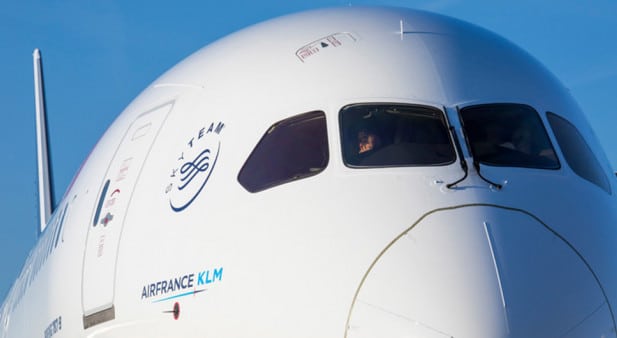
Photo courtesy of Air France KLM
Air France KLM’s engineering and maintenance division is evaluating the potential for blockchain to become its new digital ledger for managing replacement parts on in-service airplanes. During a recent webinar, the airline’s MRO division joined Microsoft and Ramco Aviation to discuss their research into future uses of blockchain in aircraft maintenance.
In January, IBM became one of the first companies to propose the use of Blockchain as a way to improve the aircraft maintenance process for airlines. Originally popularized by its association with the recording of bitcoin transactions, blockchain is a data structure with the ability to establish a digital archive of data shared across networks of computers in a public or provide configuration.
“However, in the last couple of years, there has been more interest in its distributed-ledger capabilities,” said Richard Knight, a member of the Microsoft “Global Black Belt” team based in Asia.
Air France KLM engineering and maintenance is using its MRO Lab to experiment with the future possibilities of blockchain. The French aircraft maintenance provider uses its MRO Lab to partner with universities, manufacturers and software developers within and outside of the aviation industry to explore how they can make new ideas and concepts a reality within aviation MRO. KLM has found it so successful that it has opened a second lab — MRO Lab Singapore — in collaboration with Ramco Systems.
According to James Kornberg, director of innovation of the Air France KLM business unit, his team is looking to establish a clear business case for the use of blockchain to improve maintenance processes and work flows.
“The use case has to be realistic,” said Kornberg. “The four features of blockchain are resilience, traceability, integrity and disintermediation are well suited to the aviation supply chain.”
Using Microsoft Azure and blockchain, Ramesh Sivasubramanian, a Ramco Aviation engineer, demonstrated the actual process of an Air France aircraft coming under an aircraft on the ground (AOG) status due to a hydraulic system failure. After troubleshooting the mock AOG situation, the engineering team concluded that the system has an actuator that is in need of repair.
Sivasubramanian then showed how an Air France engineer was able to acquire a replacement actuator by creating a blockchain ledger for it that could be viewed by the engineer, the AF KLM logistics and loan officers, and any other engineer or technician involved in getting the replacement part to Air France.
Lufthansa’s Industry Solutions division has created the Blockchain for Aviation (BC4A) initiative, in which it hopes to bring together software developers, aircraft manufacturers, MRO service providers and more to collectively create a foundation for the future use of blockchain in the aviation industry. The company has even introduced a one-day IT training course that “teaches participants the technical basics of blockchain solutions and demonstrates their potential,” according to its website.
Accenture also says it can help airlines “cut through the buzz” and actually start using blockchain to change the way they do business, according to a recent overview on the topic published by its aerospace consulting division.
Jeff Cass, VP of strategy for the aviation and defense business unit at IFS, also believes the combination of cloud security and blockchain can help airlines reinforce their cybersecurity protocols.
Kornberg said AF KLM is looking at how it can overcome the reality that the existing non-electronic data it currently manages with aircraft components, systems and parts would not easily transition to a blockchain environment.
“In the aviation industry we still have a lot of our data that is not digitalized, still a lot of analog data, the first step, and that’s what we’re doing at the moment — going to a fully digital solution, on all the supply chain and all the aviation data that we get,” said Kornberg. “And before we do that, blockchain cannot be applied on non-electronic data.”